
13 Nov 2024
RIYADH: Saudi Arabia will need to construct 115,000 homes annually over the next six years to address the demands of its growing population, according to new research by Knight Frank.
In its latest release, the real estate consultancy firm emphasized that this substantial increase aims to fulfill the Kingdom’s 70 percent homeownership target by 2030, up from 63.7 percent at the end of 2023.
Christopher Payne, partner and chief economist at Knight Frank MENA, said: “The Kingdom aims to create a nation of homeowners with all the attendant benefits that this brings, including economic stability and stimulus, wealth building, and community engagement.”
An active housing market provides “greater choice, flexibility, and resilience for the Kingdom’s residents,” he added.
The report underscored the collaborative approach of the Ministry of Municipalities and Housing and the National Housing Co. in working with both private and international stakeholders to deliver affordable and diverse housing options.
It described this effort as “a national housing program” that will mobilize various partners to address both the demand and supply sides of the housing market.
Recent initiatives include NHC’s partnerships, such as a deal with Egypt’s Talaat Moustafa Group to build over 27,000 homes, and an agreement with China’s CITIC Construction Group to establish an industrial city for construction materials.
Payne added: “MOMAH’s initiatives helped to increase spending on residential construction from 5.5 percent of non-oil GDP to 8.5 percent in 2022.”
Knight Frank projected that 65 percent of the anticipated 825,000 new homes by 2030 will be driven by household formation from marriage, while the remaining 35 percent will stem from the Kingdom’s goal to elevate homeownership rates.
Additionally, it is noted that “existing platforms” will be utilized to ensure Saudi nationals have access to housing, reflecting the ministry’s aim to make homeownership more accessible to a young, expanding population.
Further supporting this growth, the government’s Sakani program, launched in 2017, has helped low- and middle-income families access housing through mortgage guarantees, loan subsidies, and reduced payments. Sakani has facilitated over 800,000 housing contracts, spanning ready-made homes, self-construction, and off-plan units.
With a significant portion of new housing developments projected in Riyadh due to rising demand from economic activity, Knight Frank noted that “urban centers like Riyadh” will play a crucial role in fulfilling the demand.
This trend is already evident in the capital’s property values, where apartment prices have surged by 62 percent, and villa prices by 37 percent over the last three years.
Future phases of the Sakani program aim to enhance housing affordability and availability through added incentives for developers and a wider range of housing options. Complementing these efforts is the ministry’s Etmam initiative, which facilitates “one-stop” online access for project approvals, streamlining processes and expediting construction.
Knight Frank concluded that Saudi Arabia’s proactive housing strategies and Vision 2030 housing targets will unlock “the economic potential of a young, expanding population,” creating a “virtuous cycle” of economic stability and growth for the Kingdom.